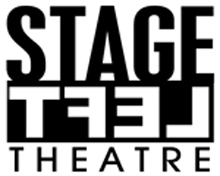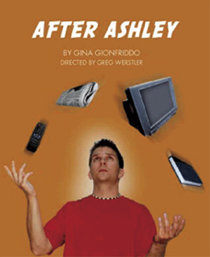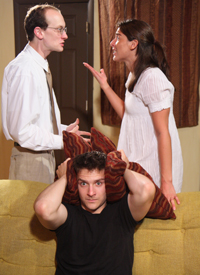
As Moore notes, the current change in artistic leadership is about the fourth or fifth major transition period for the North Side company. In addition to his artistic responsibilities, involving play selection, working with production teams on various shows, planning the annual "Leap Fest" and interacting with assorted ensemble and subscribers, Moore is also a resident playwright at both Stage Left and Chicago Dramatists. His latest play, "The Day of Knowledge" receives its World Premiere as the second play of the season at Stage Left, leaving some insiders to joke that next year may be an "all David Alan Moore season". Moore laughs off that possibility, but it is clear that writing is a high passion for him. "On one hand I consider myself a writer and playwright in particular, since I am a full-time freelance writer in my day job, and working with words, creating the stories and working with scripts and actors is my primary love."
Although none of the original founders of Stage Left remain, the ensemble ethic is still a vital part of the company's existence. "Over the 27 years the ensemble has gone through various periods of transition, some peaceful and some less so. Right now I think we are at a very exciting time. We still have a very strong core ensemble and a strong commitment to the mission of doing social and political theatre. Right now these changes give us the freedom to ask how we can do what we've been doing (in the past) and do it better." Stage Left's commitment to new plays is as strong as ever and includes the Downstage Left program which develops original work, the "Leap Fest" original play festival every spring, and "DrekFest," which Moore describes as "a wonderful tongue-in-cheek look at the new play process."
It was "DrekFest" that brought Greg Werstler to the attention of Kevin Heckman when he directed a little gem called "The Savage Beating of the Jungle Tom Toms Once More, Once More," which had the dubious distinction of winning the national competition for "Worst 10-minute Play ever written". Werstler, who is also Managing Director of ComedySportz, describes his current project as a very dark comedy about media sensationalism, which never paints a true or accurate picture of its subjects. "The story revolves around a tragedy that befalls a family living outside WashingtonD.C. in 1999, traces the next four years and how society takes this tragedy and makes it part of our culture without really knowing any of the details of the situation. The father writes a book about the crime's impact and gets a TV show, while the son is struck by the fact that none of the stories about his mother are actually her or anything to do with her."
Greg says the play offers a great deal of comedy, but in a more realistic manner than slapstick or farce. "It uses comedy to make its point that we in society are craving these salacious details about complete strangers. The comedy comes out of the truth, playing the characters and situation truthfully. There can be anger and frustration in comedy, it's just where you direct that frustration. If you direct that anger at your scene partner, that's drama. If you direct the anger at the circumstance, at the world or at the ideas, that can lead to comedy. The challenges are finding the balance between the drama that is contained in the satire and the comedy. For me, the comedy helps us earn the drama. It's what makes the audience comfortable and reels them in. Then the playwright delivers the message, the reality of the situation. Finding that balance, and finding actors in the audition process who were facile enough to play both sides of the spectrum, was a challenge."
 "After Ashley" premiered at the renowned Actors Theatre of Louisville's Human Festival and was produced Off-Broadway, where it won two Obie Awards. The author, Gina Gionfriddo has not been involved directly in the Chicago production, although respecting the playwright's vision and intent is clearly important to Werstler. "My process is probably to a fault very collaborative. I ask for and encourage opinions from everyone from the actor to the Stage Manager to the Set Designer. One of the great things at Stage Left is that spirit of collaboration and supportiveness. There was a decision I made in the play and during the artistic transition David and Drew asked me to come in to discuss my choice. It was never ‘We want to catch you doing something wrong,' it was ‘Help us understand why you made this choice, let us voice whatever concerns we may have', and ultimately they were both very supportive of the choice."
"After Ashley" premiered at the renowned Actors Theatre of Louisville's Human Festival and was produced Off-Broadway, where it won two Obie Awards. The author, Gina Gionfriddo has not been involved directly in the Chicago production, although respecting the playwright's vision and intent is clearly important to Werstler. "My process is probably to a fault very collaborative. I ask for and encourage opinions from everyone from the actor to the Stage Manager to the Set Designer. One of the great things at Stage Left is that spirit of collaboration and supportiveness. There was a decision I made in the play and during the artistic transition David and Drew asked me to come in to discuss my choice. It was never ‘We want to catch you doing something wrong,' it was ‘Help us understand why you made this choice, let us voice whatever concerns we may have', and ultimately they were both very supportive of the choice."
As a playwright himself, Moore understands the sensitive creative egos involved in play production, and the importance of presenting feedback in the right way. "When I'm working with new plays at Chicago Dramatists and at Stage Left, I try to keep my ideas (as a writer) outside of the process. Ultimately what we want is for the individual playwrights to come up with their own solution and create an expression of what concerns them the most. When we get to the core of making art, as viewers and creators what we want to see is something that reflects the truth as perceived by an individual or group creating that art. I'm probably even more conscious now to avoid stepping over boundaries. It's very interesting being in the position of seeing new plays as they are submitted, being on the receiving end of queries and solicitations, and to know as a playwright how much respectful, tactful responses mean to me."
With an estimated 125 full-length plays arriving for consideration every season and at least twice that many queries to field through, David is certainly in an interesting position. "Making art of any form is a tough business," he says. "From a playwright's perspective, you're dealing with rejection all the time, so it's very important when I'm approached by a playwright with their script that I respond respectfully." Greg feels it is important in dealing with playwrights to avoid asking the obvious questions, such as "'What the hell were you talking about here?' Playwrights are an interesting collaborator because they're all very different in how involved or uninvolved they want to be. I try to respect that and to help them understand how (their work) could be interpreted down the road by someone who isn't sitting next to them. (As a director) you've got to trust that the playwright knew what he or she was doing and had an intention with everything they put on the page."
In his Jeff Award winning new play "In Times of War," produced two seasons ago at Stage Left, David points to a "wonderfully positive experience" working with Director Ann Filmer. "That was a dream collaboration for a playwright. In fact, when I would report back on my experience to fellow playwrights, they would say ‘Oh, you're being spoiled.' Ann was fantastic. She took the play I had written, and she very much included me (in the rehearsal process) both as a resource for her but also so I could gain insight on the script I had written. Ann challenged me regularly, asked me very detailed and focused questions. Sometimes I saw things and realized there was a better way to do them. Part of the initial work with a director is finding your best working process and adapting accordingly. As artists, we all have a singular voice and unique vision, then we bring all of these unique visions into a room together and we somehow try to hammer out a production that draws on the best of those visions. (The goal is to) create a cohesive show and respect everyone's input without necessarily taking everyone's input, which would be chaos."
Greg hopes that audiences at "After Ashley" will laugh a bit and also be challenged by the play's message. "Hopefully the next time there's a missing wife or the daughter of a political figure who's pregnant or gay or some other salacious detail, maybe they'll think it's none of their damn business. Maybe they'll turn on Championship Poker or read a book or write a play. I don't want to judge that because what are plays but a chance to be a little voyeuristic. The fault I find is it's not the whole story, that we disrespect the subjects of our obsessions. The media only gives us enough to make us crave more details. The truth is often contrary to what they want us to know."
 Both David and Greg are excited to be involved in Stage Left at this turning point in its history. David believes that the commitment of the ensemble to doing excellent work is what has allowed Stage Left to survive 27 years in a highly competitive storefront theatre marketplace. "We're always setting the bar just slightly higher than we reach, and ideally that's the way it should be. We're always trying to do better plays, better work to connect to audiences more effectively. That's what drives the people in the room. Sometimes we stub our toes or fall on our faces, sometimes we succeed wildly. Hopefully the next 27 years will show more of the latter."
Both David and Greg are excited to be involved in Stage Left at this turning point in its history. David believes that the commitment of the ensemble to doing excellent work is what has allowed Stage Left to survive 27 years in a highly competitive storefront theatre marketplace. "We're always setting the bar just slightly higher than we reach, and ideally that's the way it should be. We're always trying to do better plays, better work to connect to audiences more effectively. That's what drives the people in the room. Sometimes we stub our toes or fall on our faces, sometimes we succeed wildly. Hopefully the next 27 years will show more of the latter."
"After Ashley" begins previews October 9, opens October 14 and runs through November 15, 2008. Stage Left is proud to announce that they are joining the League of Chicago Theatres in the Free Night of Theatre event. Anyone who has never before attended a Stage Left production is welcome to attend the After Ashley performance on Thursday, October 16 free of charge! Started by Theatre Communications Group in 2005, the Free Night of Theatre program has expanded from three cities in its debut year to over 20 participating theatre communities in 2007.
For further information, call 773-883-8830 or visit www.stagelefttheatre.com.
Joe Stead
Theatre In Chicago News Contributor Joe Stead has spent over 20 years as a critic, director, designer and performer. His reviews currently appear online at www.steadstylechicago.com.
